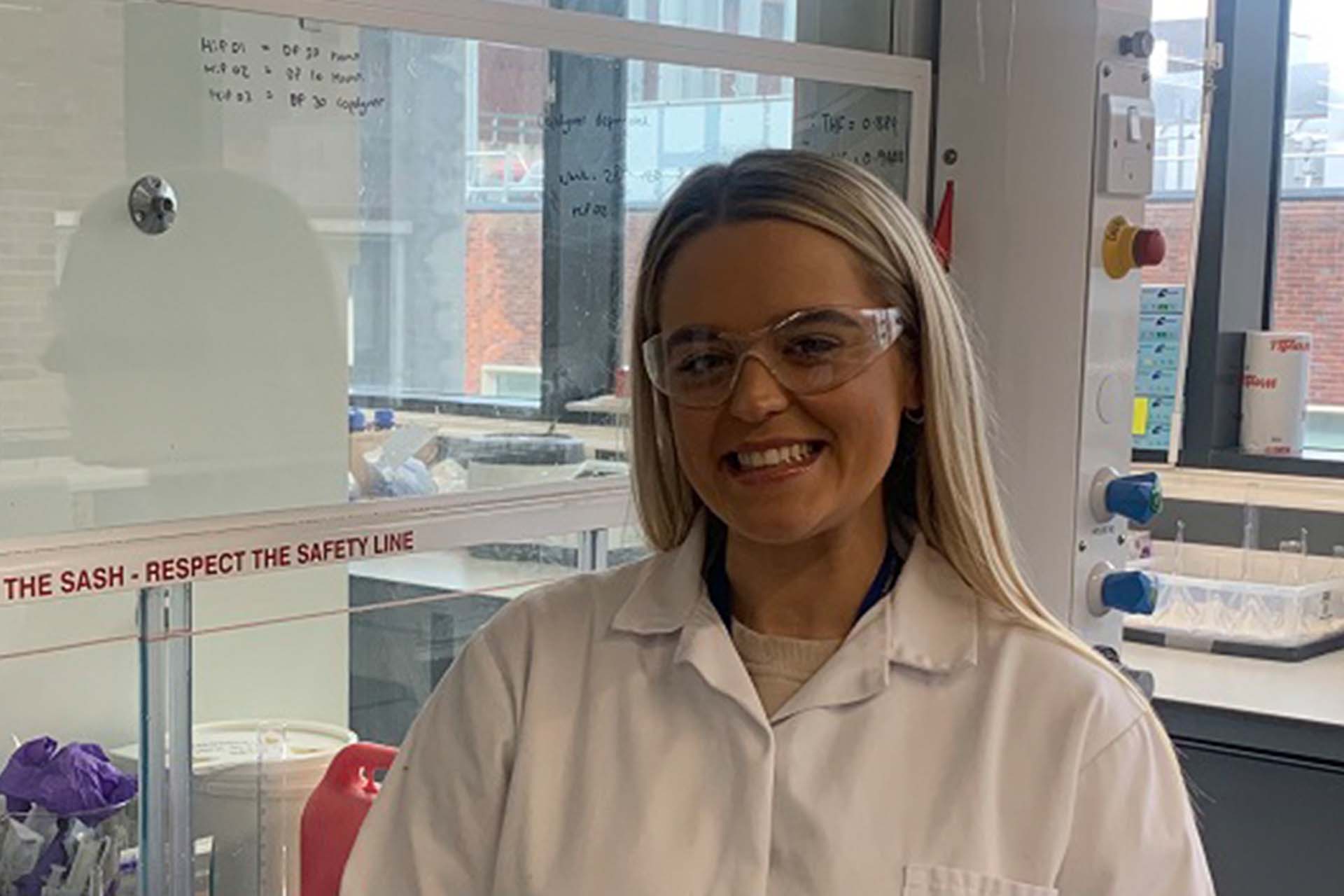Dr Jessica Taylor
"My PhD ignited a fierce passion to use my expertise to make a clinical difference to women’s and children’s health."
Born – Liverpool, UK
PhD – University of Liverpool, UK
Joined University of Liverpool – 2013
Position – Postdoctoral Researcher, Department of Chemistry
Group Name – Rannard Research Group, Functional Materials Team

What is your research about?
My research focuses on the development of nanomedicine formulations for the prevention of premature birth. Worldwide, preterm birth occurs in up to 15 million pregnancies per annum, and is a leading cause for neonatal morbidity and mortality. The treatments we are interested in improving - and that are currently used for prevention of sudden preterm birth - are classified as tocolytics which are used to decrease the intensity and frequency of contractions in early labour. By using these medicines, we can increase the gestation time to co-administer steroids to enhance fetal lung maturation, with the aim of improving survival rates and long-term health when babies arrive into the world.
Although various tocolytics currently exist, many suffer from pharmacological drawbacks and a range of potential maternal and fetal side effects, mainly due to poor aqueous solubility and the possibility of placental transfer, therefore posing a potential threat to the baby. Over the past couple of years, we have aspired to encapsulate tocolytics in nanoparticles to improve the pharmacological performance and side effects of the existing treatments to improve the clinical outcome for maternal and fetal health.
What or who first inspired you to be interested in your research subject?
My initial love for science began in school. I loved learning and exploring the complexity of science to understand the wider world, with a huge range of interests from molecular biology to chemical reactivity. I became obsessed with wanting to thrive academically to be able to make a difference in the real world, with a particular passion for healthcare.
After my school years, I studied A Levels in chemistry, biology and Spanish before coming to the University of Liverpool to study an integrated master’s degree in medicinal chemistry and pharmacology. After achieving a first-class masters and the Syngenta Prize for Pharmacology, I decided to pursue a PhD here at Liverpool.
My PhD ignited a fierce passion to use my expertise to make a clinical difference to women’s and children’s health, as I personally feel that this field is often under-represented by the scientific research community. From a personal perspective, having friends and family who are no strangers to pregnancy implications, miscarriage and neonatal loss, I felt this was the route I was destined to contribute to.
What are you most proud of achieving during your research career so far?
From a research perspective, being able to materialise new novel formulations from an initial idea and showcase them to the scientific community through presentations, publications and at conferences is extremely rewarding.
On a personal level, I am very proud of my charitable contributions to the cause that I have achieved throughout completing my PhD. I have managed to raise over £800 for Tommy’s, a charity dedicated to researching causes and treatments for miscarriage, preterm birth and baby loss, alongside raising over £1,600 for Liverpool Women’s Hospital towards their Big Tiny Steps Appeal.
What techniques and equipment do you use to conduct your research?
Conducting my research requires a highly collaborative approach. We work with chemists, physiologists, medics and pharmacologists as being able to make a difference within the obstetric fields requires a range of people with a range of expertise, all with a similar passion to create change.
The key techniques I use include dynamic light scattering to measure nanoformulations averages sizes and dispersity, organic synthesis to modify molecules, and high-performance liquid chromatography to quantify drug content.
Which other subjects are important for your research?
The main areas which are important for my research are material science, nanoscience, physiology, pharmacology, and obstetric medicine.
What impact is your research having outside of academia?
Having met patients during public and patient information conferences who have had personal experiences with sudden preterm birth and tocolytics, telling these patients about our work on bench top advances in the field benefits them greatly and encourages them to provide feedback and makes them aware of potential new trials. It also greatly improves the overall relationship between medical staff, researchers and patients.
Through building a relationship with members of the public who have been impacted by pregnancy complications, we are able to provide them with the reassurance that their experience is of great importance to us and that helping them through research is our main priority.
There is real scope for applying nanomedicine to prevent preterm birth. It is a hugely exciting area and will be collaboratively developed in the near future.
What advice would you give to someone considering a career in research?
I would suggest that you choose to pursue conducting research in an area that you really have a passion for and one that will empower you with a feeling of determination to make a real difference. In addition, be open to collaboration with others, be resilient even when there are hurdles, and never lose sight of the bigger picture. Make sure that you share your research with others as much as you can.
Where can readers learn more about your research?
Publications that have underpinned the materials chemistry development of lipid-based formulations, including this article published in Nanoscale advances, entitled: "Using pyrene to probe the effects of poloxamer stabilisers on internal lipid microenvironments in solid lipid nanoparticles".